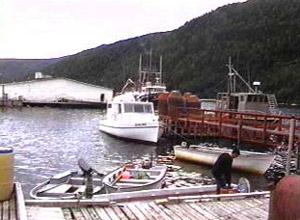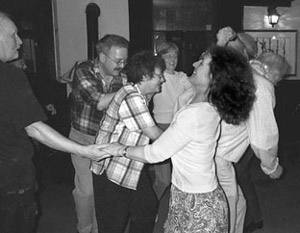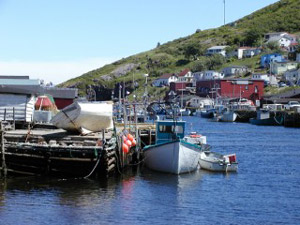Newfoundland: A Map of the Sea
Air Date: Week of January 28, 2005
A rare look from inside a community that has lost its longtime reason for being. Newfoundland producer Chris Brookes listens to what was lost and what has remained in two communities since the disastrous over-fishing of the region’s Atlantic cod.
Transcript
GELLERMAN: It's Living on Earth. I'm Bruce Gellerman. In 1992, catastrophe struck the once-gigantic Atlantic cod fishery off Newfoundland. Scientists and fishermen suddenly discovered that the Northern Cod had been fished to commercial extinction. A ban on catching cod was put in place, but it came too late. And the fishery has never recovered.
Chris Brookes is a Newfoundland journalist who's watched his fellow islanders grapple with the consequences. His report is part of "Worlds of Difference," a documentary series on global cultural change.
[MUSIC AND DANCING SOUNDS]
MAN: I don't know, some people say this is a metaphor for life. You know, life is a big elaborate dance. And it's all about keeping your feet while the music changes. Because the music does change, right?
[DANCING STOPS]
BROOKES: Okay, this recording is the Fort Amherst foghorn. I make a lot of recordings. Like this one (SOUND OF FOGHORN). This is the sound of fog, rolling in the harbor past my house. [FOGHORN] When I'm recording, it's the sound of the present. I put the tape on a shelf and when I play it back days or weeks or years later, of course, it's become the sound of the past. [FOGHORN] A little spool of memory, measuring the gap between then and now. And I feel like there's something sad about the gap, but I don't know why. It's just things changing.
[FOGHORN]
BROOKES: Of course, this isn't really the sound of fog; fog is something you can't hear on the radio. This is a foghorn: a thing that evolved entirely because of fog. So, it's kind of like the voice of fog.
[WOMAN'S VOICE HUMMING]
BEST: Okay, how about that?
BROOKES: I made this recording of the singer Anita Best last summer.
BEST: Ready?
BROOKES: A navigational song.
BEST: [SINGING] From Bonavist' Cape to the stinkin' isles, The course is north for 40 miles, When you must steer away noreast till Cape Freells Gull Island bears nor' norwest. Then nor' norwest 33 miles, three leagues offshore lies Whadhams Isles, where all the rock you must take there, two miles south scuddies from miles it bears…
BEST: Sometimes songs were used as navigational aids for people who couldn't really read charts and maps. And you wanted to be able to make the right turns to get around the reefs and rocks and stuff, you know.
BROOKES: So, it's kind of a sung map?
|
The vanished Newfoundland fishing community of Harbour Deep. Founded in the 17th century, its last residents left in 2002. (Credit: Fred Campbell) BEST: Yeah. Oh yeah, absolutely. Yeah, in a symbolic kind of way, yes, we used to sing our way around the world. Like the Australians have the song lines. It's an interesting idea to find your way around in the world by song. [SINGING] Therefore, my friend, I would you advice, since with all those rocks and danger lies, that you may never amongst them fall, but keep your love and weather them all. [SINGING FADES UNDER] BROOKES: A friend of mine likes to point out that Newfoundland is the oldest non-aboriginal culture in the Americas. Before the Plains Indian had the horse we were here, singing the fishing grounds. Like the foghorn with the fog, we evolved entirely because of the fish, and for five centuries we sang, we danced, we spoke the language of fish. Our culture was their voice. Then, suddenly, the fish were gone. It was 12 years ago. The tapes on my shelf sound like this. NEWS MUSIC, NEWSCASTER: In the news tonight, net loss. Atlantic ground fish stocks nose dive amidst warnings of economic disaster in the maritime fishery..[FADES TO MALE VOICE]: It's a major and social economic catastrophe. It's the best way of saying it. [FADES] SAM: There's always hope. Not much of it. But my mind frame now is telling me that the fish is not gone, it's moved somewhere. Right? And in time it'll come back to us. It's just, you can't even imagine never having a cod again. BROOKES: Twelve years later people can imagine it. The cod fishery is still closed, taking 30,000 jobs with it. Lots of people have left--there were 12,000 a year leaving the island at one point. And some fishing communities have died [HORN] BROOKES: This is one of them. A place called Harbour Deep. I took my tape recorder there four years ago when it was still alive. MAN: I remember seven miles…. BROOKES: It was a three-hour ferry ride to get there. No road. [CAPTAIN ‘BE THERE IN 40 MINUTES…] BROOKES: The community itself. It was Sunday. [CHURCH SINGING] BROOKES: A decade earlier the little church would have been full. But listen to this recording and you'll hear just ten voices. [SINGING: We will rejoice…] And outside of the church no one was rejoicing. They were talking about leaving. WOMAN: We're just packing now, getting ready to go. BROOKES: Where are you going? WOMAN: On the ferry tomorrow, going to New Brunswick. BROOKES: You been here all your life? WOMAN: Yes, yeah, I've been here all my life. BROOKES: Has it changed a lot in the last few years? WOMAN: Yes. Yeah. I mean, people are moving out too now, you know, it makes a lot of difference to the place. There's no in-shore fishery like there used to be. Years ago, you know, everyone would be fishing here, that made a lot of difference. Now, that's all gone. And there's not many people around. And that makes it look lonely. Would you like to have a cup of tea? You said you'd like to have a cup of tea. I'll give you a cup, too. BROOKES: Thank you. BROOKES: The fish didn't come back, and the people left. A year after I visited, the isolated fishing community vanished from the map. But it lives on as a dance. A dance that for centuries was done nowhere else but in Harbour Deep. A pattern of steps called Running the Goat.
|








